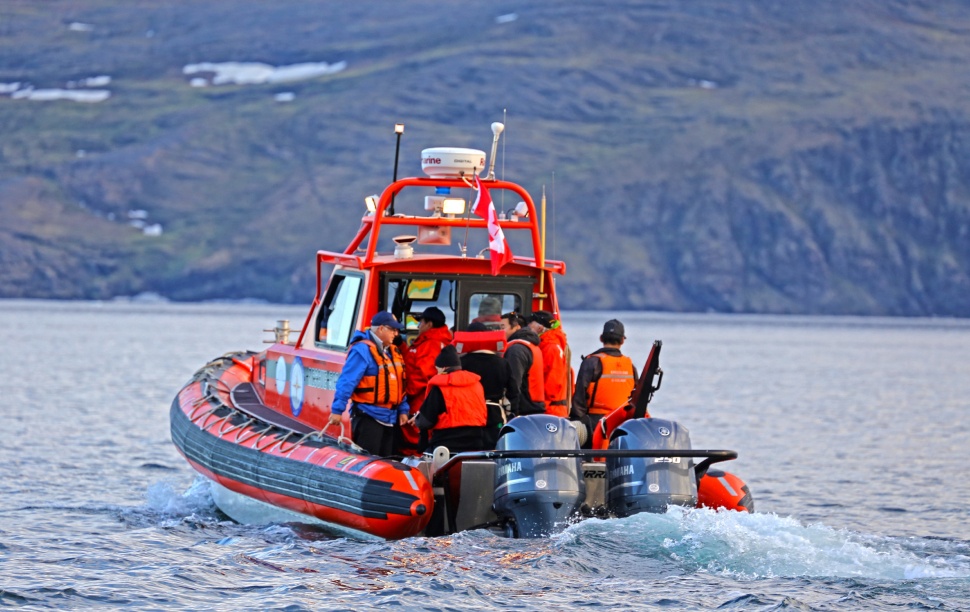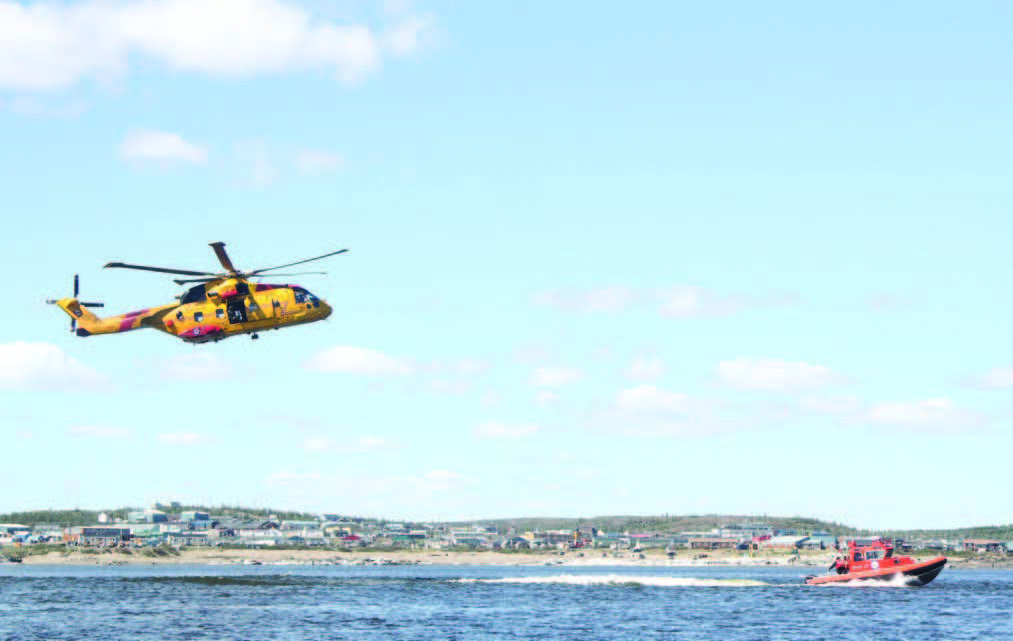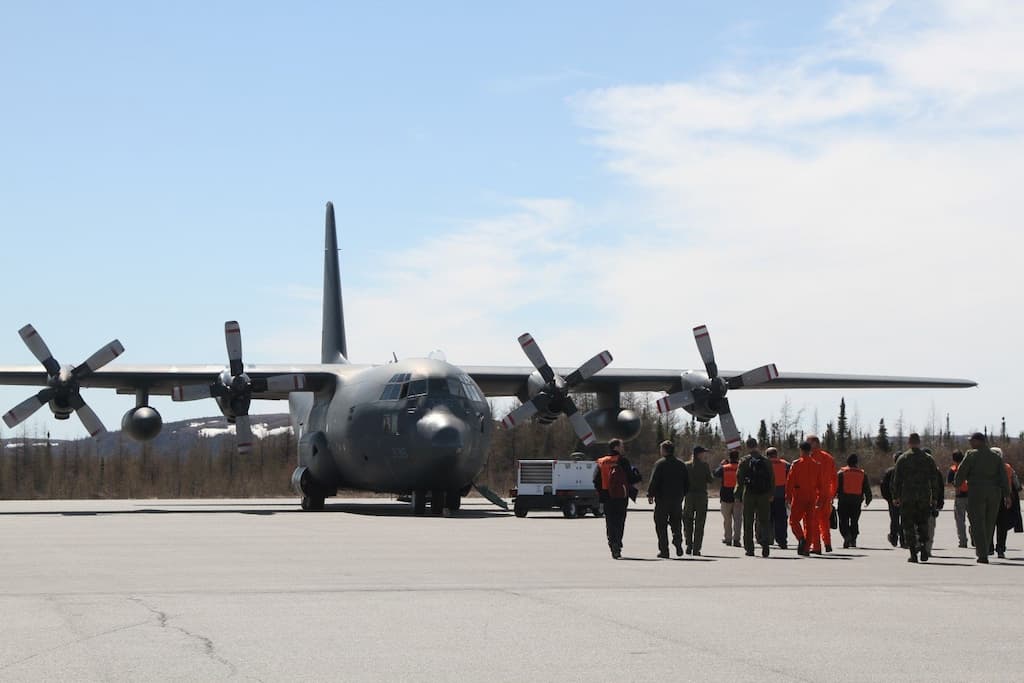Search and Rescue

The Nunavik Police Service is the agency responsible for the coordination of inland search and rescue operations in Nunavik in close collaboration with community, regional and provincial authorities. Since 2012, the NPS is also a formal partner of the Joint Rescue Coordination Centre (operated by the Canadian Forces in cooperation with the Canadian Coast Guard) for responses relating to maritime or aeronautical incidents in and around Nunavik.
Travellers on the land and along the region’s coasts are responsible for ensuring they possess basic survival skills and safety knowledge, and that they always carry with proper survival equipment.
Inland search and rescue procedures
Inland, lake and river search and rescue planning in Nunavik provides for three levels of increasing response in case of an emergency. These levels involve various actions and organizations.
Level 1
Case A: A person or group of persons travelling outside the municipality is overdue in returning to their place of stay or in reaching their planned destination.
Case B: A person or group of persons needing immediate rescue from a dangerous situation or for immediate medical attention.
In both cases, the NPS and the local mayor must be advised immediately.
Also for Case A:
- When the missing person is a resident, family and friends initiate a search within the municipality to ensure that the missing person did not (unknowingly) return to the municipality;
- If the search by family and friends is unsuccessful, the local mayor activates the municipal emergency operations centre and plans, organizes and initiates a ground search;
- When the missing person is not a resident, the Chief of the NPS requests that the local mayor activate the municipal emergency operations centre, and plan, organize and initiate a ground search.
Also for Case B:
- The Chief of the NPS with the assistance of the local mayor will take whatever immediate actions are necessary;
- The Chief of the NPS may decide to immediately raise the search and rescue response to Level 3.

Level 2
A Level 2 response is activated if the Level 1 response fails to successfully resolve the situation.
- The ground search is expanded;
- Based on the recommendation of the municipal emergency operations centre, the local mayor and the local NPS may recommend to the Chief of the NPS the use of an aircraft or helicopter to further expand the search;
- The Chief of the NPS may charter an aircraft or helicopter;
- The Chief of the NPS informs the Sûreté du Québec (SQ).
Level 3
A Level 3 response is activated if the Level 2 response fails to successfully resolve the situation.
- The Chief of the NPS requests the assistance of the SQ;
- The SQ takes over the search and rescue operations;
- The Chief of the NPS keeps the local mayor informed of any significant developments in the search and rescue operation when the missing person is a resident;
- The decision to terminate the search and rescue operation is at the discretion of the SQ. However, if the missing person is a beneficiary of the James Bay and Northern Québec Agreement (JBNQA) and the municipality wishes to continue the operation after the SQ has called off the search, financial assistance may be requested from the Director General of the KRG and be obtained for a maximum period of seven days.

For a complete description, refer to the Procedure for Land Search and Rescue in the Kativik Region (2009).
Maritime and aeronautical search and rescue procedures
Definitions
Aeronautical incident – An incident involving an aircraft.
Maritime incident – An incident on a navigable waterway (i.e. waters served by sealift operations) or in coastal waters (any waterway, inlet or river that can be navigated up to one mile inland or to the first man-made obstruction, such as a bridge) involving a water vessel, including the medical evacuation of individuals from a water vessel.
Role of the JRCC
The Joint Rescue Coordination Centre (JRCC) is operated by the Canadian Forces in conjunction with the Canadian Coast Guard. The JRCC is fully responsible for planning, coordinating, controlling and conducting maritime and aeronautical search and rescue (SAR) operations in and around Nunavik.
For each maritime and aeronautical SAR operation, the JRCC will:
- Determine and request the most suitable resources.
- Request assistance from suitable community resources such as:
- Search and rescue vessels;
- Canadian Ranger units;
- Fire departments;
- First responders;
- Other local resources.
Incidents involving swimmers, divers or persons on sea ice, travelling by means other than a water vessel, are qualified as humanitarian incidents. Responsibility for humanitarian incidents lies not with the JRCC, but with the NPS in accordance with the Procedure for Land Search and Rescue in the Kativik Region.
Role of the Nunavik Police Service
The first NPS officer informed of a maritime or aeronautical incident will:
- Advise northern village emergency services of the incident;
- Assist northern village emergency services to gather as many details related to the incident as possible in order to help focus SAR operations;
- Inform the Chief of the NPS immediately.
The Chief of the NPS will:
- Advise the JRCC of the incident and transfer control for the SAR operation to the JRCC;
- Advise the JRCC of all community resources available to assist with the SAR operation;
- Inform the northern village and Kativik Regional Government (specifically the Director General) authorities about the SAR operation;
- Assist the JRCC with the SAR operation by acting as a regional liaison and coordinator;
- Maintain a detailed operation log;
- Distribute SAR operation updates provided by the JRCC to other agencies and concerned parties in a timely manner.
For a complete description, refer to the Search and Rescue Procedure for Maritime and Aeronautical Incidents in the Kativik Region (2012).
For more information
- To learn more about search and rescue procedures in and around Nunavik, contact the NPS by telephone at 819-964-2488 or toll free at 1-800-964-2644.
- For information on the status of any current search and rescue operations, visit this page.
- To report a missing person or group, contact your local police station immediately.